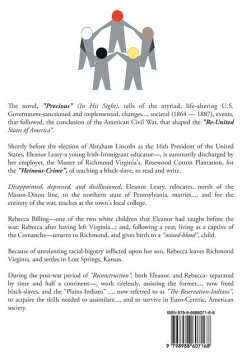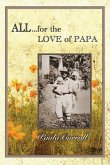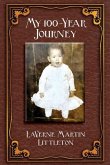The novel, "Precious" (In His Sight), tells of the myriad, life-altering U.S. Government-sanctioned and implemented, changes..., societal (1864 - 1887), events, that followed, and the conclusion of the American Civil War, that shaped the "Re-United States of America". Shortly before the election of Abraham Lincoln as the 16th President of the United States, Eleanor Leary-a young Irish-Immigrant educator-, is summarily discharged by her employer, the Master of Richmond Virginia's, Rosewood Cotton Plantation, for the "Heinous-Crime", of teaching a black-slave, to read and write. Disappointed, depressed, and disillusioned, Eleanor Leary, relocates, north of the Mason-Dixon line, to the northern state of Pennsylvania, marries..., and for the entirety of the war, teaches at the town's local college. Rebecca Billing-one of the two white children that Eleanor had taught before the war; Rebecca after having left Virginia...; and, following a year, living as a captive of the Comanche-returns to Richmond, and gives birth to a "mixed-blood", child. Because of unrelenting racial bigotry inflicted upon her son, Rebecca leaves Richmond Virginia, and settles in Lost Springs, Kansas. During the post-war period of "Reconstruction", both Eleanor, and Rebecca- separated by time and half a continent-, work tirelessly, assisting the former..., now freed black slaves, and the "Plains Indians" ..., now referred to as "The Reservation-Indians", to acquire the skills needed to assimilate..., and to survive in Euro-Centric, American society.








